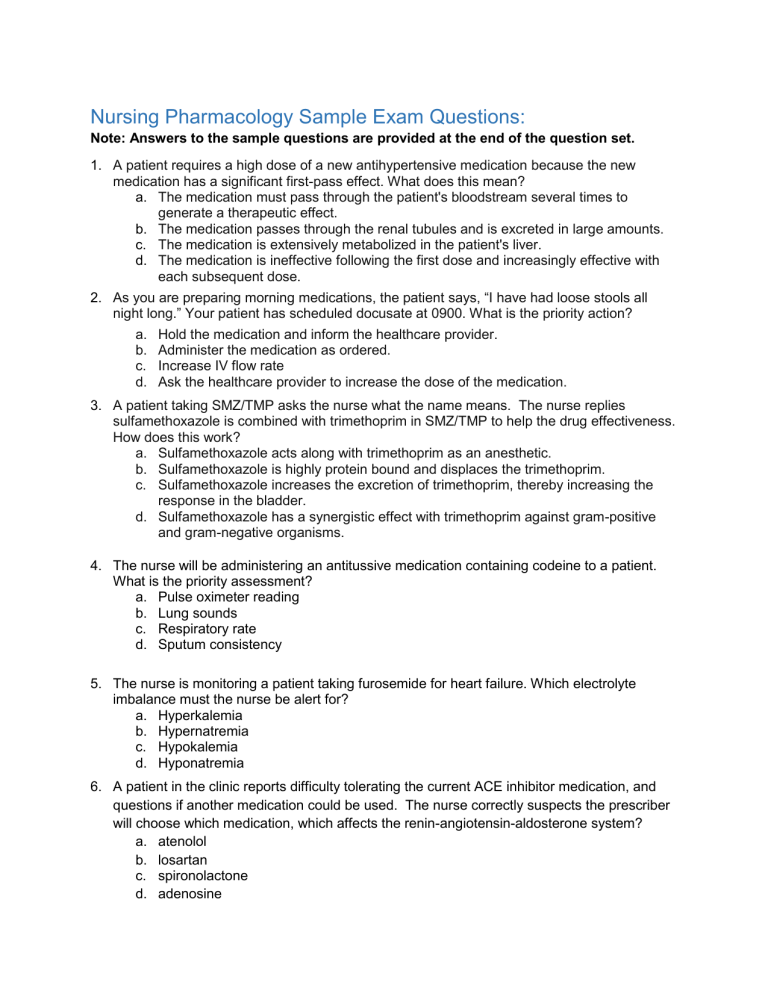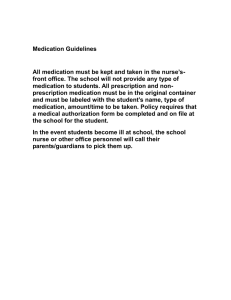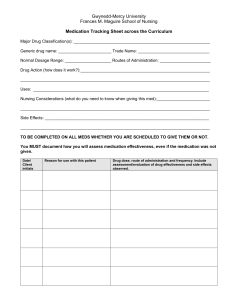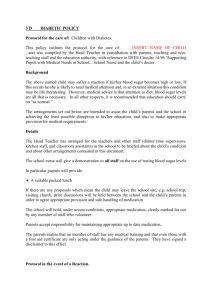
Nursing Pharmacology Sample Exam Questions:
Note: Answers to the sample questions are provided at the end of the question set.
1. A patient requires a high dose of a new antihypertensive medication because the new
medication has a significant first-pass effect. What does this mean?
a. The medication must pass through the patient's bloodstream several times to
generate a therapeutic effect.
b. The medication passes through the renal tubules and is excreted in large amounts.
c. The medication is extensively metabolized in the patient's liver.
d. The medication is ineffective following the first dose and increasingly effective with
each subsequent dose.
2. As you are preparing morning medications, the patient says, “I have had loose stools all
night long.” Your patient has scheduled docusate at 0900. What is the priority action?
a.
b.
c.
d.
Hold the medication and inform the healthcare provider.
Administer the medication as ordered.
Increase IV flow rate
Ask the healthcare provider to increase the dose of the medication.
3. A patient taking SMZ/TMP asks the nurse what the name means. The nurse replies
sulfamethoxazole is combined with trimethoprim in SMZ/TMP to help the drug effectiveness.
How does this work?
a. Sulfamethoxazole acts along with trimethoprim as an anesthetic.
b. Sulfamethoxazole is highly protein bound and displaces the trimethoprim.
c. Sulfamethoxazole increases the excretion of trimethoprim, thereby increasing the
response in the bladder.
d. Sulfamethoxazole has a synergistic effect with trimethoprim against gram-positive
and gram-negative organisms.
4. The nurse will be administering an antitussive medication containing codeine to a patient.
What is the priority assessment?
a. Pulse oximeter reading
b. Lung sounds
c. Respiratory rate
d. Sputum consistency
5. The nurse is monitoring a patient taking furosemide for heart failure. Which electrolyte
imbalance must the nurse be alert for?
a. Hyperkalemia
b. Hypernatremia
c. Hypokalemia
d. Hyponatremia
6. A patient in the clinic reports difficulty tolerating the current ACE inhibitor medication, and
questions if another medication could be used. The nurse correctly suspects the prescriber
will choose which medication, which affects the renin-angiotensin-aldosterone system?
a. atenolol
b. losartan
c. spironolactone
d. adenosine
7. The nurse is caring for a patient who is taking warfarin. The nurse notes the presence of
gross hematuria and large areas of bruising on the patient's body. The nurse notifies the
health care prescriber and anticipates what medication will be ordered?
a. heparin sulfate
b. protamine sulfate
c. phytonadione (Vitamin K)
d. oral potassium supplements
8. A patient is about to receive a morning dose of digoxin and has an apical pulse of 53
beats/minute. Which of the following actions should the nurse do first?
a. Hold the dose
b. Administer the dose as scheduled
c. Notify the charge nurse of the findings
d. Contact the provider for dose adjustment
9. What should the nurse include when teaching a patient regarding the use of omeprazole?
a. Take after meals to increase drug effectiveness
b. Take before meals to increase drug effectiveness
c. Take with meals to increase drug effectiveness
d. May take without regard to meals or other medications
10. A child is receiving methylphenidate. The mother tells the nurse the patient is having trouble
sleeping while on the medication. What is the best response by the nurse?
a. “Give the medication before 4:00 pm.”
b. “Give the medication at 8:00 pm.”
c. “Stop the medication immediately and see the doctor.”
d. “Add diphenhydramine at bedtime.”
11. A patient with type 2 diabetes mellitus asks the nurse how metformin decreases blood
sugar. What is the best response by the nurse?
a. the medication decreases glucose production in the liver
b. the medication increases insulin resistance of the cells in the body
c. the medication blocks carbohydrate absorption in the intestine
d. the medication increases insulin release from the pancreas
12. The nurse is administering oxycodone to a patient. Which common side effect should the
nurse teach the patient about?
a. Paresthesia in lower extremities.
b. Increased intracranial pressure.
c. Occipital headache.
d. Drowsiness.
13. Enteric coated acetylsalicylic acid has been prescribed for a patient to treat chronic arthritis.
The patient calls the clinic nurse because of gagging and difficulty swallowing the tablets.
What response would the nurse give to the patient?
a. “Crush the tablets and mix with juice or food”
b. “I’ll notify the healthcare provider for a medication change”
c. “Open the tablet and mix the contents with food”
d. “Swallow the tablets with large amounts of water or milk”
14. A patient has an order for metoprolol. Prior to medication administration, what does the
nurse need to assess?
a. Respirations
b. Temperature
c. Heart rate
d. Oxygen saturation
Sample Question Answers:
1. c, 2. a, 3. d, 4. b, 5. c, 6. c, 7. b, 8. c, 9. a, 10. b, 11. a, 12. a, 13. d, 14. b, 15 c.




